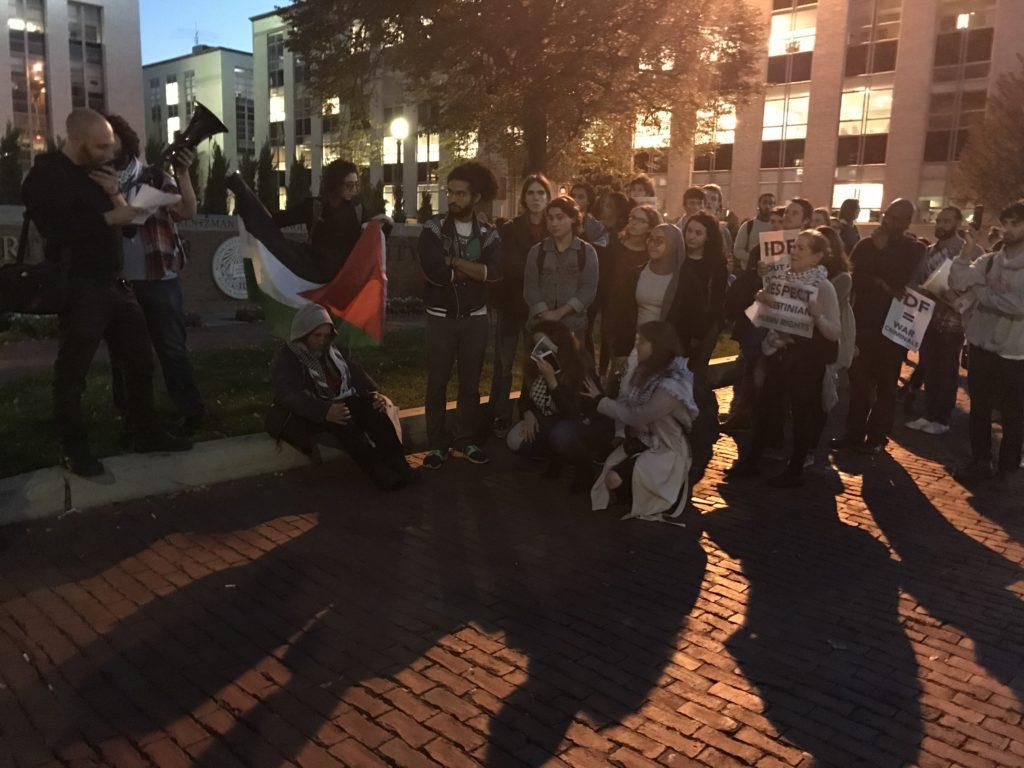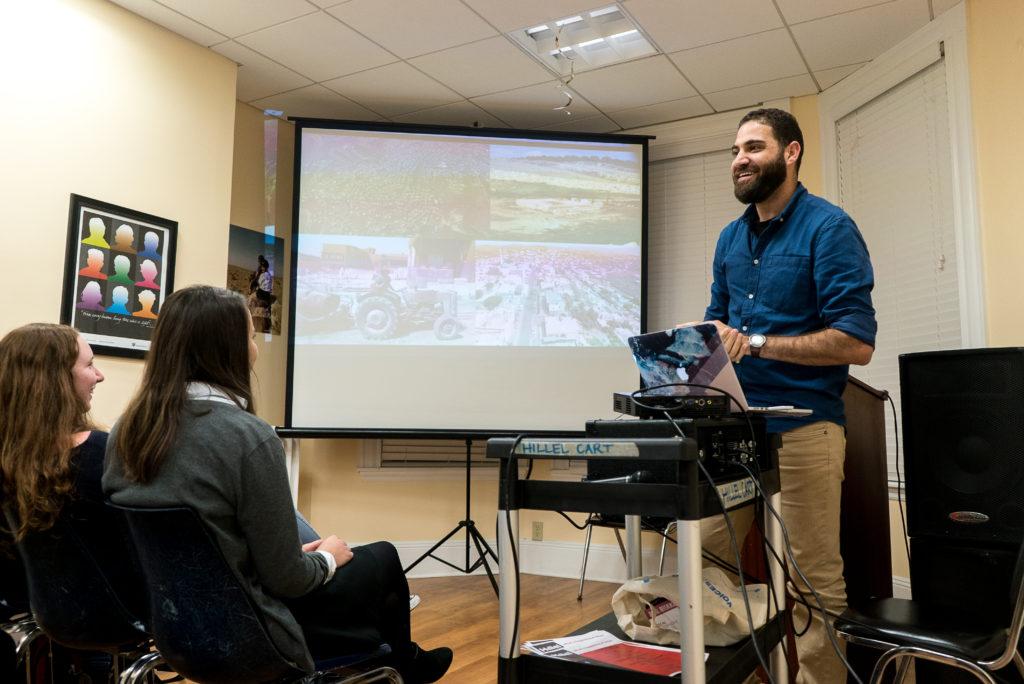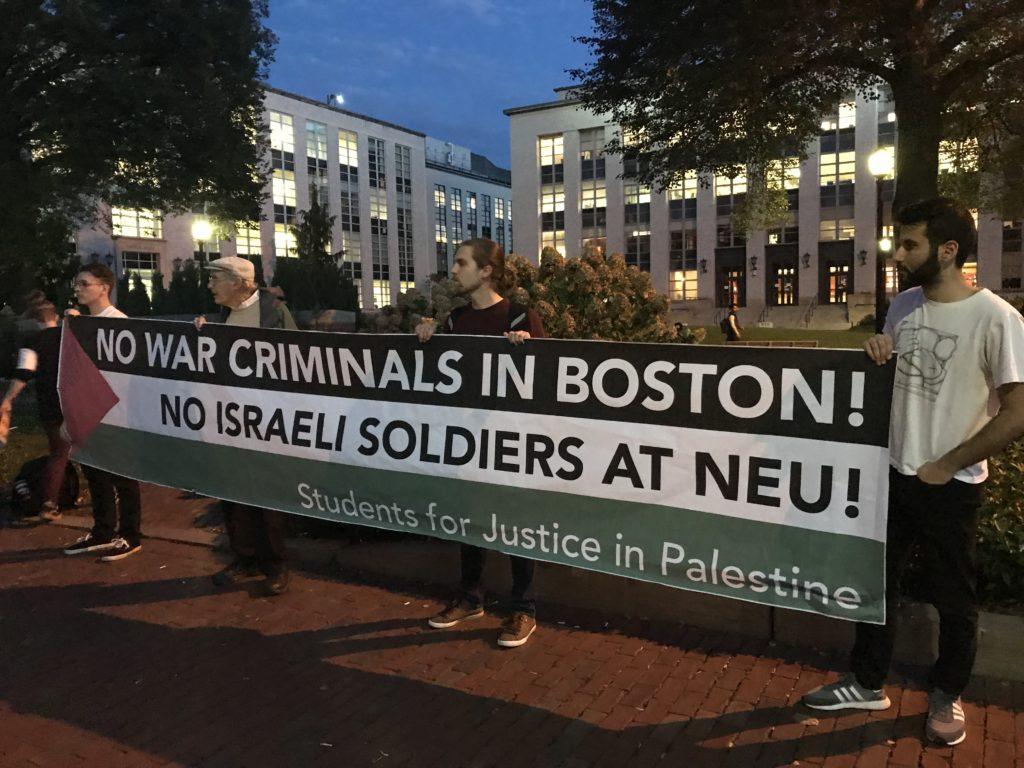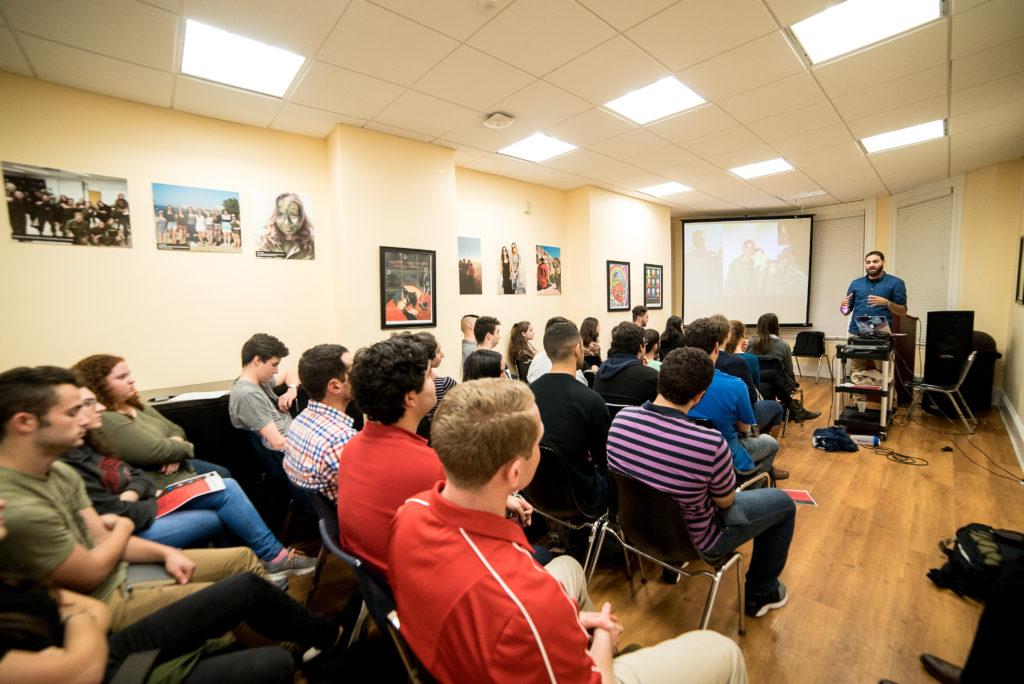By Ysabelle Kempe and Janette Ebbers, news staff
Former Israeli Defense Force soldiers came to speak on their experiences serving for the Israeli army at Northeastern University Hillel Nov. 2, where they were met by nearly 100 protesters outside the Jewish center.
The visit was part of the eighth annual Israeli Soldiers Tour and was organized by StandWithUs, an international non-profit focused on educating the public on Israel and fighting anti-Semitism.
The Israeli Soldiers Tour representatives, Keren and Haithom, who goes by Tom in the United States, have been travelling across North America sharing their experiences with the IDF at college campuses, high schools, synagogues and churches that applied for speakers to visit. Last names of the former soldiers could not be provided due to security policy.
“I never took the fact that I was free for granted or that Israel was there as a homeland for Jewish people for granted,” Keren said, explaining why she dedicates her time to advocate for Israel.
The West Bank is currently controlled by the Palestinian Authority, but is under Israeli occupation. Gaza is governed by Hamas, an Islamist fundamentalist organization which the United States characterizes as a terrorist organization. The area is under Israeli blockade but not troop occupation.
The Israeli-Palestinian conflict can be divisive: Almost 100 people gathered outside to protest the event. The demonstration was organized by Northeastern’s on-campus group Students for Justice in Palestine, or SJP, in solidarity with the Palestinians victimized by Israeli Defense Forces, or IDF, according to a statement released by SJP.
Alyssa Zimmer, a fifth-year environmental studies and political science major at Northeastern, said the Jewish community especially must be aware of the issue.
“I think, as a Jewish person, it’s extremely important that atrocities aren’t perpetuated in my name,” Zimmer said. “I think it’s unacceptable for a state to be discriminating, killing and essentially doing modern-day apartheid.”
Protesters picketed in front of Hillel, banging plastic buckets, chanting and holding signs reading “IDF=War Criminals,” “Justice for Palestine” and “No more Israeli Apartheid,” in reference to claims made by pro-Palestinian activists who see the Israeli presence in the West Bank as parallel to Apartheid in South Africa.

Not all agreed with the SJP’s method of protest. Brenna Sorkin, a fourth-year student and resident of the apartment across from the demonstration, was at home when she heard a sudden buildup of noise from the street, prompting her to go investigate. Sorkin said protests like these, in addition to being noisy, do very little to solve the issue in question. She said this mentality can be seen when looking at any camps on opposite sides of the Israeli-Palestinian conflict, whether they’re countries or Northeastern clubs.
“There’s no discussion,” Sorkin said. “No one’s trying to put on an event that’s like, ‘Let’s talk about the politics of Israel.’ It’s trendy to say, ‘It’s apartheid,’ ‘IDF is terrorism,’ but there’s no conversation.”
Inside the Jewish center, Keren and Tom spoke about how they came to serve in the IDF. Although the yelling from the protesters echoed into the room, the speakers ignored it for the most part until it eventually stopped.
Keren, 24, said she made Aaliyah — the Hebrew word for immigrating to Israel — when she was 16. After completing high school she enlisted in the IDF serving first as a basic training commander and then as a paratrooper. She was honorably discharged in 2013. Now, Keren is a student at Ben Gurion University in Israel, studying government and politics.

Keren relayed her childhood experiences of growing up around anti-Semitism in the United States and stressed the impact that anti-Semitism has had on her family. She said her grandmother, a Holocaust survivor, has not cut her hair since the war because “they cut your hair in the camps.”
“I was in eighth grade science class, and my friends pulled me outside to a locker with a swastika drawn on it,” Keren said. “Growing up, I couldn’t understand why people hated me just because I was Jewish. I always felt like Israel was the place I needed to be.”
Tom, 30, is a Bedouin Muslim from a village in northern Israel who volunteered for the IDF and ended up in the Air Force unit. He went on to get a degree in law, government and management at the Academic College for Law and Science in Israel. Currently, Tom prepares Israeli teens for their service in IDF as part of a nonprofit organization called Acharai, which translates to English as “follow me.”
As a Bedouin, Tom was not required to join the IDF, as all Israelis who are Jewish, Druze or Circassian are. However, most of the male members of Tom’s family had enlisted, so he followed in their footsteps and ended up stationed in the West Bank. The West Bank is subject to censure for human rights violations, especially in regards to the West Bank Barrier, which separates parts of the West Bank from Israel. To many, this wall is a symbol of oppression: protesters included the chant “Brick by brick, wall by wall, Israeli apartheid has to fall!”
Tom recalled arresting a young Palestinian man who was planning a terrorist attack. Once in the IDF car, Tom asked the man multiple times why he would want to kill when the Muslim religion expressly forbids it, and only got silence. The fourth time Tom asked, however, the man spoke.
“‘You are free, you have a decent life in Israel. We don’t have that, no one from the Palestinian Authority cares how we live or what we need. I did this for for my family,’ the man said. ‘Yes I will go to jail, but the Israelis take good care of us in jail, and because of this terror attack I will be a hero and my family will be heroes and they will get money on a monthly basis from the Palestinian Authority — more than we can get even I work the whole month back home,’” Tom said.
Malcolm Clark, one of the protest organizers, said although it is important to have a variety of voices heard on university campuses, the line must be drawn at welcoming IDF soldiers.
“They’re here to make themselves look good,” said Clark, a second-year English major and leader of SJP. “It’s really unacceptable to have representatives from an occupying army, especially an occupation that’s holistically illegal, has been declared illegal by a variety of human rights groups. It’s known that the IDF perpetuates all these horrific war crimes.”
The demonstration was co-sponsored by almost 20 other on- and off-campus organizations, ranging from the Progressive Student Alliance to Jewish Voice for Peace Boston.
After demonstrators circled around St. Stephen Street under the eye of police and two legal observers, they marched to Krentzman Quad to listen to speeches in front of the Northeastern University sign. Omer Hecht, a former IDF soldier, spoke to the crowd and said the liability for war crimes is not limited to the IDF.

“Israel and the Israeli army have been committing war crimes against Palestinian people, in which I, and all Israelis, are complicit,” Hecht said. “To those who say I should not judge what I would not want done to me, I say, I am the first one to turn myself into the war crimes tribunal.”
Hecht was discharged from the IDF as a conscientious objector. Many at the protest, like Hecht, objected to the IDF speakers partially on the basis of their backgrounds.
Sorkin said awareness is extremely important in negotiating divisive issues.
“When I saw what it was, it makes me angry, and it makes me feel unsafe, but I think a big part of it is that no one’s trying to talk about the actual politics, and talk about an actual solution,” Sorkin said. “It’s a very ‘us versus them’ issue on both sides.”
Back inside, after Karen and Tom shared their stories, they opened the floor for a question-and-answer portion, fielding questions from students on how to deal with people who are intolerant or discriminatory against Israel. Keren, especially, was passionate about the importance of informed conversation.
“Invite them to coffee. Those people, you speak to them alone, you might change their mind,” she said. “If they refuse, put liberalism in their face, show them it’s ridiculous they won’t have coffee.”









